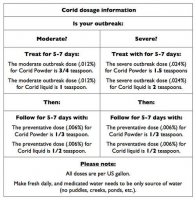- Jun 9, 2017
- 84
- 60
- 131
I have 5, 6 week old chicks, and 3 full grown layers. I've been noticing blood in their feces, I first noticed about a week ago, I figured out which one I thought it was a corinteened it. After a full day with no bloody poop I returned her to her sisters because she seemed lonely. Yesterday morning i noticed a lot of bloodly feces so I suspected it was cocci. I went out and bought corid which I added to their water, 1 tsp/gallon. Today there was still lots of blood, and I noticed one of the little ones not looking so good. I watched her drink water. Then I picked her up to try and prompt her to eat she appeared to spit up while I was holding her. A clear liquidy sort of thing is what came out. I'm very worried for her and all of my other chickens. I've attatched some pictures so if you guys have any other ideas or thing it might be something else any little bit of information helps! Thanks!






